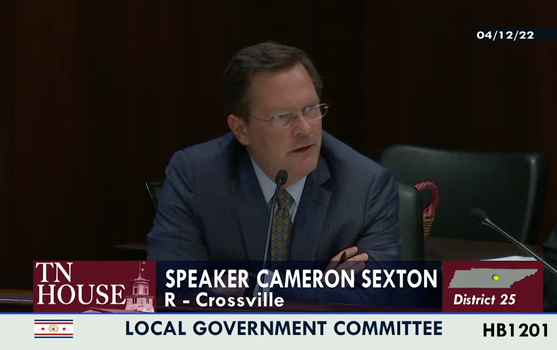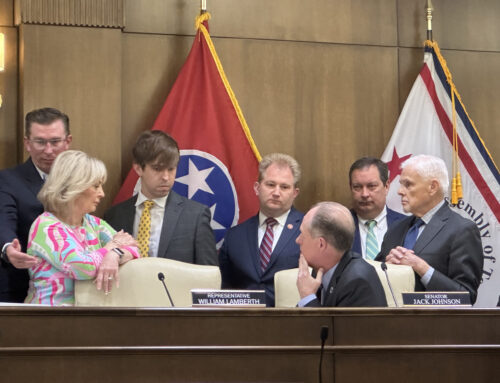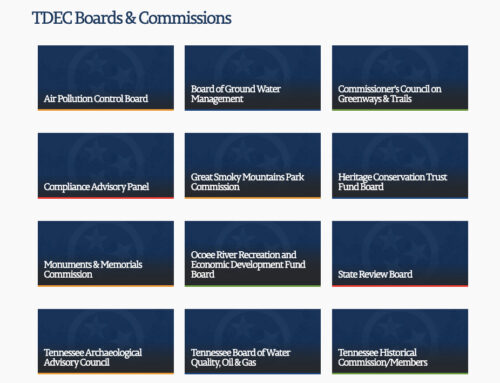A bill that would create big changes to Tennessee’s campaign finance law that the top House leader says will bring money flows “from the dark into the light” is still on the table though differences between the House and Senate versions must be resolved before final passage.
The legislation significantly increases the amount of public information available about money raised and spent by candidates and political action committees during the 10 days before an election when contributions and spending becomes intense.
Currently, only contributions and loans that exceed a $5,000 threshold for state candidates and a $2,500 threshold for local candidates have to be immediately reported during those 10 days — within one business day of the contribution. Otherwise, they can be reported in the next reporting period after the election.

The House’s top leader, Speaker Cameron Sexton, R-Crossville, said the changes will bring money flows “from the dark into the light.”
The bill expands the reporting to include expenditures. It also lowers the amount triggering what must be immediately disclosed during this period. The House and Senate bills vary on the new reporting threshold, with the House bill more aggressive at $1,000 or more for all types of candidates and the Senate bill allowing a $3,000 threshold for state senate candidates and a $5,000 threshold for statewide candidates, such as for governor.
The new reporting would become effective July 1 this year and affect this year’s races.
Daily contribution, spending reports must be on state website
The bill also requires the Tennessee Registry of Election Finance to post those daily reports of contributions and expenditures to its website “as soon as practicable.” The Registry of Election Finance handles contributions and expense reports from candidates for state office.
For candidates for local office, county election commissions must post reports “as soon as practicable” but only if the commission otherwise posts campaign finance reports to a website. Many county election commissions do not post campaign finance reports to a website, so in those counties, they would only be available to the members of the public if they ask for them.
“It’s all about transparency and it’s about accountability,” said the top leader of the House, Speaker Cameron Sexton, in describing the bill earlier this month in the House Local Government Committee (see video). “The voters of Tennessee, when you watch all the different elections, they want more transparency in campaign finance. They want to know who’s behind the money, how they’re spending the money because they’re trying to influence an election.”
Sexton said the enhanced reporting requirements within the last 10 days before an election mirror what is required on the federal level. “Within the last 10 days of a campaign, instead of hiding your expenditures or hiding these contributions and holding off and not being transparent, all this says is you can continue to receive those contributions, you can pay for those TV ads, you just have to report it.”
The bill is a comprehensive rework of several parts of the campaign finance law though some of the changes are tweaks and others are more substantial.
Bill would require 501(c)(4) nonprofits to report ‘campaign’ expenditures
The most intense lobbying against the bill has come from nonprofits organized under the IRS Code § 501(c)(4),(4), or (6).
If the bill becomes law, these organizations for the first time will be required to report expenditures exceeding an aggregate total of $5,000 on communications that “expressly contain the name or visually depict the likeness of a state or local candidate in a primary or general election” within “60 calendar days immediately preceding a primary or general election in which the named or visually depicted candidate appears on the ballot.”
They would also be subject to the new potentially daily reporting requirements during the 10 days before a primary or general election, but only for aggregate expenditures above $5,000.
The House version exempts some types of communication by these nonprofits such as any “written, oral, or electronically transmitted communication by any membership organization solely to its members.”
Americans for Prosperity, the National Rifle Association, American Conservative Union, Right to Life and others have argued the bill will chill their political speech and is not clear enough.
They are mainly concerned that the legislation will be used to eventually force them to reveal their contributors, which they do not have to do now as nonprofit organizations, or otherwise discourage them from any communications mentioning candidates within the 60-day preceding period, such as a scorecard on voting records.
The bill does not say the nonprofits have to reveal contributors — only expenditures — and during testimony on the bill, lawmakers said revealing contributors would not be required.
Sexton, during the House committee meeting, admitted that some groups don’t like the proposed new reporting requirement. “I can understand that because maybe they’re not doing all positive stuff. Maybe they just want to do negative stuff. But what you do know is if you’re trying to do something in a 60-day window in a campaign cycle, you’re trying to influence somebody’s vote.”
Senate Speaker Randy McNally who is the bill sponsor in the Senate pushed back on claims that contributors to nonprofits will be revealed, saying that “blatant untruths” are being spread to make citizens and others believe that lawmakers are trying to get the organizations to identify their donors.
“Openness and transparency in the political process are prerequisites to freedom. For too long liberals, big corporations and corrupt political actors have been allowed to exploit loopholes in our system and operate in darkness,” McNally said.
Candidates won’t be able to use PACS to pay fines
Another provision in the bill bars a candidate who has been fined for violating the campaign finance laws from paying the fine with money from a political action committee that the candidate controls. Instead, the candidate is personally liable for the violation and fine. In 2020, former House Speaker Glen Casada used campaign money held by his political action committee to pay a $10,500 civil penalty levied by the Tennessee Registry of Election Finance.
“If you do break the law and you’re held accountable, why in the world would we allow them to use their political money which someone gave them to do something political with to pay off those penalties for them breaking the law?” Sexton said in describing the bill.
The bill also requires more itemization of expenditures, requires candidates and PACs to keep campaign funds separate from other funds, including personal funds, and imposes enhanced document retention.
Officeholders and candidates will have to reveal more about their income
Changes also would require candidates for office as well as current officeholders and top governor staff to be more transparent about their income by reporting sources of income of more than $5,000 in an annual disclosure. This will apply to candidates for, or members of, the General Assembly, members of the governor’s cabinet, cabinet-level staff members, members of the Registry of Election Finance, members of the Tennessee Ethics Commission, the Secretary of State, the Comptroller of the Treasury, the State Treasurer, and members of the State Election Commission. This would include such income by their spouses.
Rep. Sam Whitson, R-Franklin, one of the main sponsors of the House bill, said the intent is that if “I have a consulting company on the side, I have to disclose those clients that spend more than $5,000 by law.” Whitson said that such disclosure is already required at the federal level. He noted that doctors or lawyers don’t have to report such sources when doing so would violate a patient’s or client’s legal privacy privilege.
Changes to Registry of Election Finance meant to increase transparency
Other parts of the bill:
- Prohibit using pre-checked boxes on contribution solicitation mailings that would commit the contributor to future contributions using their credit card or bank information.
- Adds two members to the Registry of Election Finance appointed by the Advisory Committee on Open Government. This is in the House version, not the Senate version. It would require the appointees “in the judgment of the advisory committee, have a demonstrated non-partisan interest in promoting government transparency and public accountability in the political process.” Sexton said the measure was included in the House version because “two people from the open government side to be the watchdogs and overseer gives us an added protection of making sure that that board is not political.”
- Requires that any settlement of a fine of more than $25,000 by the Registry of Election Finance or the Tennessee Ethics Commission be done in a public meeting. It requires an agenda for any regular meeting of either board to be posted on their websites five days in advance, and any agenda for a special-called meeting to be posted at least 24 hours in advance. The bill does not otherwise alter the Open Meetings Act requirements for adequate notice of regular or special-called meetings, which are in addition to any other requirement in the law.
Here is a link to the bill page where you can read the different amendments adopted in the House and Senate.
The bills, HB 1201 and SB 1005, have passed the floors of the House and Senate. The House, which adopted the Senate version but with the House amendments, will travel back to the Senate for it to consider on Wednesday, where it is at the top of its message calendar at 9:15 a.m. Wednesday. The Senate must decide if it will go with the version passed in the House. If they don’t go with the House version, the bill would likely go to a conference committee to work out differences.





